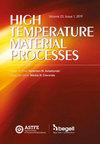钛合金基体上沉积Zr- zrn, Zr,Hf -(Zr,Hf)N和Zr,Nb-(Zr,Nb)N涂层的研究
IF 0.6
Q4 MATERIALS SCIENCE, MULTIDISCIPLINARY
引用次数: 0
摘要
研究了在Ti6Al-4V钛合金基体上沉积的Zr- zrn、Zr、Hf-(Zr,Hf)N和Zr、Nb-(Zr,Nb)N涂层的性能。结果表明,铪的加入增加了镀层的硬度,铌的加入降低了镀层的硬度。在划痕试验中,铪的引入增加了临界断裂载荷LC2的值,铌的引入降低了临界断裂载荷LC2的值。结果表明,在衬底与涂层的界面处可形成纳米晶层。这一层可能是由离子蚀刻过程中被破坏的氧化膜颗粒自发形成的,这些氧化膜在钛合金表面上自发形成。在所有温度下,与未涂层的样品相比,所有涂层样品的摩擦系数fadh的粘附成分的值都明显较低。在室温下,Zr- zrn包覆样品的fadh值最好,但当温度升至500℃及以上时,Zr,Hf-(Zr,Hf) n包覆样品具有明显的优势。本文章由计算机程序翻译,如有差异,请以英文原文为准。
Investigation of Zr-ZrN, Zr,Hf -(Zr,Hf)N and Zr,Nb-(Zr,Nb)N coatings deposited on a titanium alloy substrate.
The properties of Zr-ZrN, Zr,Hf-(Zr,Hf)N and Zr,Nb-(Zr,Nb)N coatings deposited on a Ti6Al-4V titanium alloy substrate were studied. It has been established that the introduction of hafnium increases, and niobium reduces the hardness of the coating. The introduction of hafnium also increases, and niobium reduces, the value of the critical fracture load LC2 in the scratch test. It has been established that a layer of nanocrystallites can form at the interface between the substrate and the coating. This layer is presumably formed by particles of an oxide film destroyed during ion etching, spontaneously formed on the surface of the titanium alloy. All samples with coatings have noticeably lower values of the adhesive component of the friction coefficient fadh compared to the uncoated sample at all temperatures. At room temperature, the Zr-ZrN-coated sample has the best fadh value, but when the temperature rises to 500 °C and above, the Zr,Hf-(Zr,Hf)N-coated sample has an obvious advantage.
求助全文
通过发布文献求助,成功后即可免费获取论文全文。
去求助
来源期刊

High Temperature Material Processes
工程技术-材料科学:综合
CiteScore
1.20
自引率
25.00%
发文量
31
期刊介绍:
High Temperature Material Processes is an important international publication devoted to original and invited review papers on fundamental and applied re-search and new developments in materials processing and synthesis at high temperatures, especially under the plasma action as well as the treatment by laser, ion and electron beams. Processes of interest include (but not limited to) surface treatments, alloying, coatings production, nanostructures synthesis, welding, cutting, melting, re-melting and purification of metals, metallurgy (among them plasma metallurgy), powder densification, ultra-fine powder production, waste conversion and destruction. In addition, attention is paid to the development, description and study of experimental and industrial systems and devices for the implementation of high-technology plasma and beam processes. Thus, there is a broad range of coverage of experimental, analytical and numerical studies. High Temperature Material Processes will serve the needs of those who develop high temperature processes to produce materials with improved properties, surface treatments or coatings with given specifications, and will also promote connections between laboratories and industry.
 求助内容:
求助内容: 应助结果提醒方式:
应助结果提醒方式:


